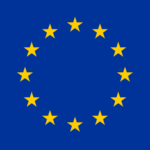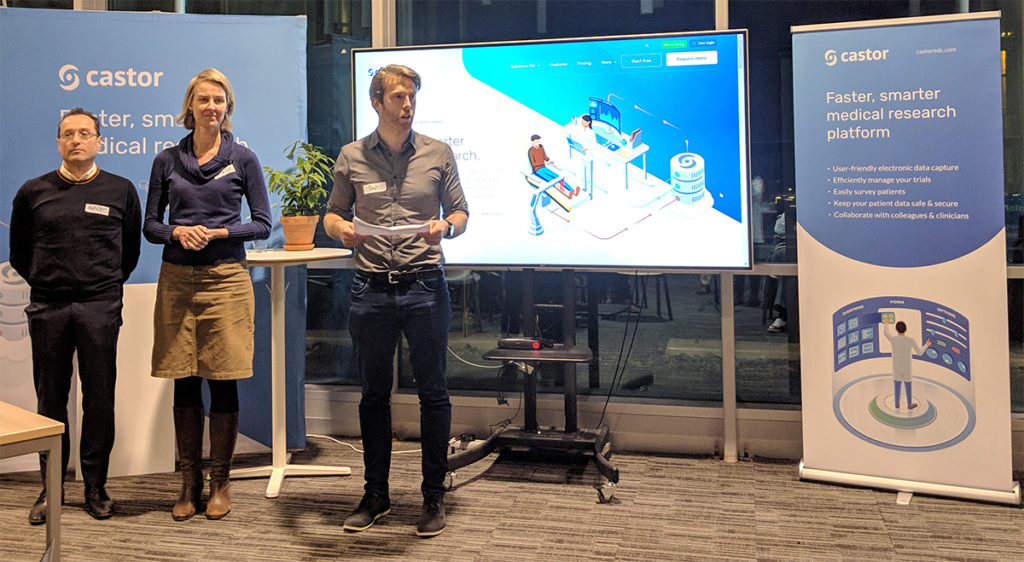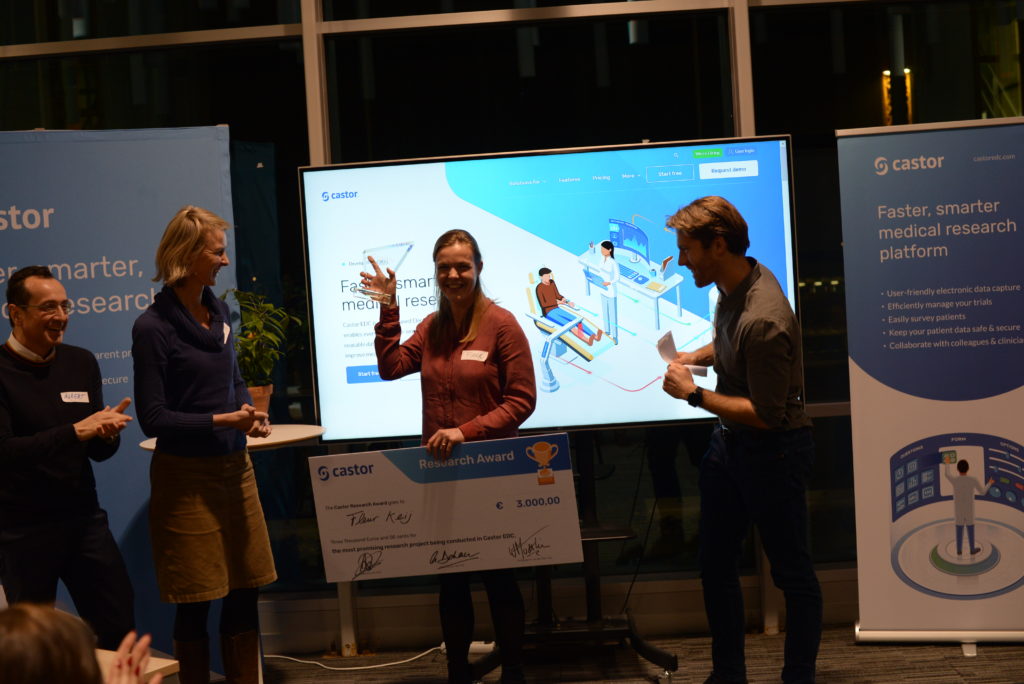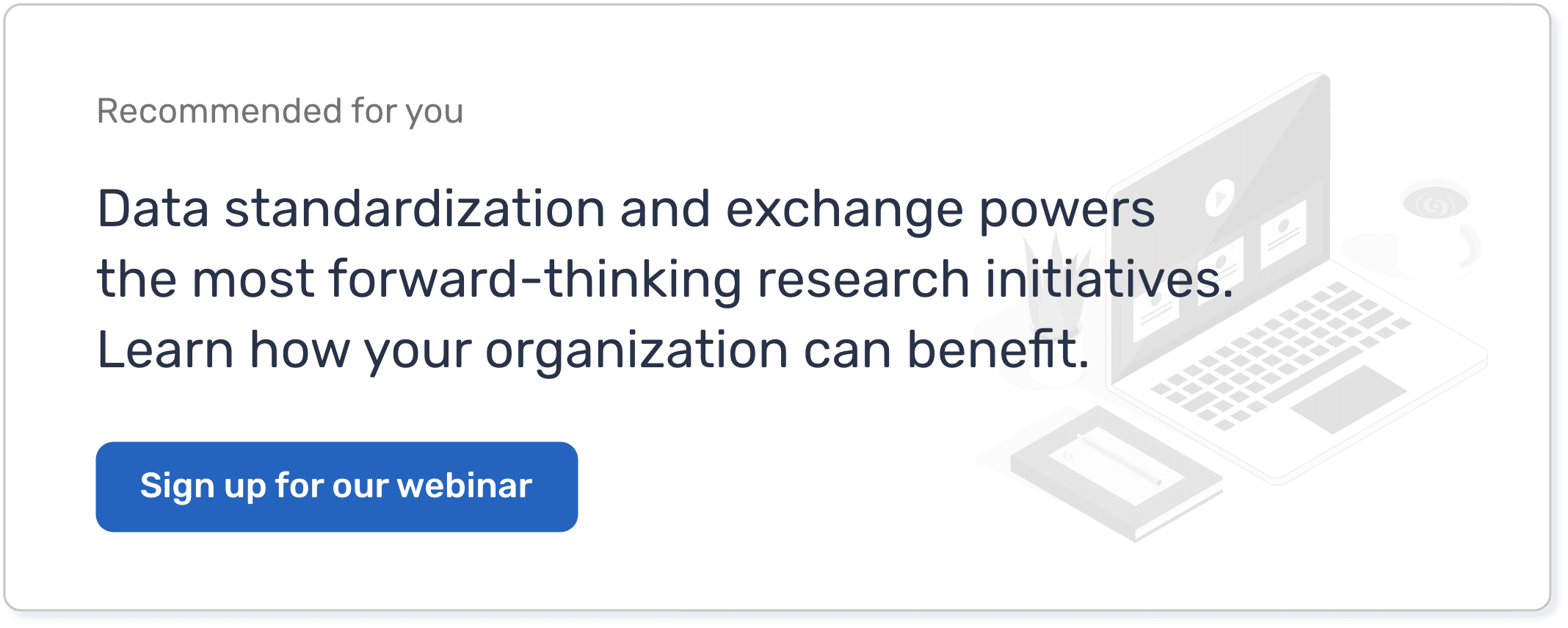How do you know if your product is on the right track? And if it is efficiently solving the problems you think your customers are facing? These were a few questions we asked ourselves at the beginning of 2018.
The solution: Ask the people who are regularly using your product! And that’s exactly what we did. We invited researchers who are using Castor to conduct their studies to share their projects with us.
We spent 2018 compiling the studies, nominating the best 9, and finally bringing all of these researchers under one roof. Months of running on all cylinders culminated in the grand finale, the Castor Research Award on 31st January 2019.
“The reason we started this research award is because it is important that people at Castor get a very clear idea of how our users are using the platform and to support young researchers in the field who are doing great things for healthcare,” – commented Derk Arts (CEO, Castor EDC).
Castor welcomed medical researchers to pitch their promising projects in front of the entire Castor team and a panel of 3 experts in the final round of the Castor Research Award. The event began with the 9 nominees who were asked to do a Pecha Kucha about their research. A Pecha Kucha is a presentation format where the presenter shows 20 slides for 20 seconds each (6 minutes and 40 seconds in total). This is quite a challenge in itself when you need to explain a complex medical project involving multiple phases and spanning over several centers in under 10 minutes! But, our nominees did a spectacular job.
Here’s a sneak peek into how these researchers have been using Castor EDC:
1. A comprehensive platform for data collection
Bas Haak & Xanthe Brands @AMC_NL investigated the role of leukocyte DNA methylation & the intestinal microbiota on the pathogenesis of community-acquired #pneumonia. Here’s a sneak peek into the #CastorResearchAward. Catch us live here – https://t.co/dLmRkVvq8O pic.twitter.com/kJio3SBpVg
— CastorEDC (@CastorEDC) January 31, 2019
2. Features they love
LIVE now: Dr. @mjschuuring of @AMC_NL investigated a new telemonitoring program for adult patients with #congenital #heart #disease through the use of innovative hardware and software. You catch the live broadcast here- https://t.co/9KKUXFcYMF#CastorResearchAward pic.twitter.com/kCR9ViHeAO
— CastorEDC (@CastorEDC) January 31, 2019
3. Not tech-savvy? Castor is simple and easy to use!
This 3-year project brings together 17 #Dutch hospitals w/ the goal to prove the non-inferiority of an early (intravenous to oral) #antibiotic switch in #neonates at risk for #sepsis https://t.co/9KKUXFcYMF @ErasmusMC @franciscuszorg @Iamsterdam @UMCU_Intl @WerkenbijAMC pic.twitter.com/CMezt0OWlZ
— CastorEDC (@CastorEDC) January 31, 2019
4. Concerned about compliance requirements? Castor has you covered.
The final nomination is a multicenter study initiated by @radboudumc to determine the effects of imaging techniques on reducing unnecessary surgical interventions & medical costs. They used @CastorEDC to collect data, randomize participants & send questionnaires #ePRO pic.twitter.com/Do3O5UiDGh
— CastorEDC (@CastorEDC) January 31, 2019
After the evening full of pitches and tough questions from the jury and the audience, the winner was announced. The grand prize was awarded to Fleur Keij, Erasmus MC-Sophia & Franciscus Gasthuis & Vlietland. Fleur’s project evaluates the safety and efficacy of an early intravenous to oral antibiotic switch in neonates at risk for sepsis (Reduction of intravenous Antibiotics In Neonates – RAIN). You can read more about this study here.
And the winner is…Fleur Keij of ErasmusUMC! Congratulations to Fleur and her team! Learn more about the winning study at https://t.co/0wA9qeZgaO. Watch the #CastorResearchAward replay at https://t.co/4H23y0NH0K pic.twitter.com/cMOV2xhHXV
— CastorEDC (@CastorEDC) January 31, 2019
We would like to thank everyone who presented their projects and attended the event to support the researchers. We are looking forward to seeing more amazing projects in Castor and next year’s Castor Research Award!
You can watch the entire event here:



